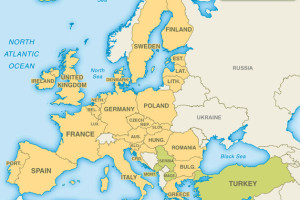Russians cheesed off as authorities destroy ‘EU’ food

(Business New Europe – bne.eu – bne IntelliNews- August 6, 2015)
Nine tons of presumed EU-made cheese seized after entering Russia from Ukraine were bulldozed into the ground on August 6 as officials enforced Kremlin orders to destroy prohibited Western products, despite protests from citizens struggling with rising food prices.
The first batch of hundreds of tons of food earmarked for destruction, the cheese was confiscated in June near the border, a spokeswoman for the Russian veterinary and phytosanitary control authority Rosselkhoznadzor in the southern Belgorod region told Interfax. “There were no labels on the products and its origin is unknown. It is quite possible the cheese was made in one of the countries under sanctions,” she said.
The load was crushed by bulldozers on the first day of implementation of a decree on food disposal signed by President Vladimir Putin on July 29. Packs of EU bacon were also burned in Belgorod, while another 20 tonnes of cheese were destroyed in Orenburg. “The cheese is called Russian but has Latvian labels,” said another spokesperson for the agency, adding that, “the products were delivered from Kazakhstan while the driver was a German national”.
According to reports, Russia had by the end of the day destroyed 55 tonnes of peaches, nectarines and tomatoes; 29 tonnes of cheese and 28 tonnes of meat. Not everyone waited for the Kremlin starting gun either: The Moscow Times reported that 114 tons of pork seized in April and found to be misclassified as being Brazilian in origin were destroyed on August 3. To speed up the overall process, the Ministry of Agriculture has announced a tender to buy “mobile food crematoria”.
However, the newspaper noted that in many of the cases there was no proof that the destroyed products fell under the Western food import ban, Officials were equally eager to destroy products with improper labeling and incomplete documentation.
Backlash as poverty deepens
But the Kremlin campaign to shut out EU products in retaliation for Union sanctions against Russia for its actions in Ukraine risks backfiring. With food inflation exceeding 20% and 16% of the population now living in poverty, scenes of the destruction shown on national television have not been well received.
More than 260,000 people have so far joined an online petition on Change.org, an international website that hosts petition campaigns, calling on Putin to revoke the decision and give the food to the needy instead.
“Sanctions have led to a major growth in food prices on Russian shelves. Russian pensioners, veterans, large families, the disabled and other needy social groups were forced to greatly restrict their diets, right up to starvation,” the petition says. “If you can just eat these products, why destroy them?”
One priest from the Russian Orthodox Church, which enjoys close ties with the Kremlin, expressed anger at the campaign, Reuters reported. “My grandmother always told me that throwing away food is a sin,” the cleric, Alexei Uminsky, was quoted as saying by the website ‘Orthodoxy and the World’. “This idea is insane, stupid and vile.”
“Such an idea can only appear with a man who has been in no need for anything in recent decades and is ready to do something like that for populism and quasi-patriotism,” Uminsky added.
Suggestions for the food’s further use included giving it to people in Africa or the war-torn Donbas region of eastern Ukraine, or processing it into animal food.
According to Rosselkhoznadzor, vegetables and fruits will be disposed of at dumps, while meat and milk products will be incinerated due to high biological risks. Small batches of products will be destroyed at refuse destruction plants at the border.
Russian condoms to fill the gap
The ban on EU products was announced one year ago in response to sanctions imposed by the EU in July 2014 over Russia’s annexation of Crimea and support for pro-Moscow rebels in East Ukraine. Recently extended by the government until August 2016, the countermeasures have been effective, say Russian officials.
“Prohibited imports have now declined by 10 times,” Rosselkhoznadzor chief Sergei Dankvert said, adding that the amounts of food destroyed would not be enormous. “I don’t think there will be a large volume, I believe there will be hundreds of tons but no more than several hundred tons,” TASS news agency quoted the official as saying.
Putin’s spokesman Dmitry Peskov offered little hope that the president will revoke his decision, saying: “The presidential decree is taking effect and must be carried out.”
While conceding that from a moral perspective, the picture “definitely does not look good”, Peskov said the issue should not be exaggerated either, given the possible health risks stemming from the products. “We are talking here about smuggled goods, which had no certificates and other documents and no one would assume responsibility and guarantee that the goods, which can look very palatable, do not pose risk to human health,” he said.
Meanwhile, federal authorities are now proposing to extend the ban on EU goods to limit imports of X-ray machines and defibrillators for hospitals, which are already complaining of poor equipment. Condoms are another possible item that will be barred under the Kremlin’s import substitution drive to make Russia more efficient at producing its own goods.
